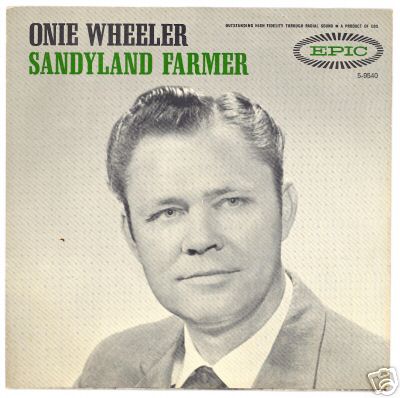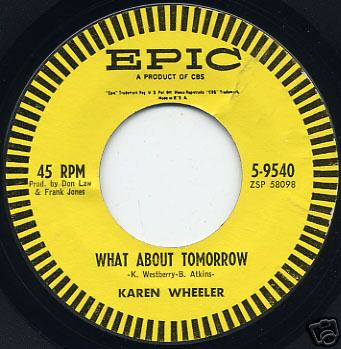

1962, USA, 7" 45rpm "Radio Station Copy"
1962, USA, 7" 45rpm
1962, USA, 7" 45rpm
Sandyland Farmer
(O. Wheeler)
KAREN WHEELER:
What About Tomorrow
(K. Westberry - B. Aikins)
Karen Wheeler
  |
|
| release | 1962, USA, 7" 45rpm "Radio Station Copy" 1962, USA, 7" 45rpm |
| label: | Epic # 5-9540 |
| A-side: | ONIE WHEELER: Sandyland Farmer (O. Wheeler) |
| B-side: | KAREN WHEELER: |
| comment #1: | Onie Daniel Wheeler , 10 November 1921, Senath, Missouri, USA, d. 26 May 1984. Wheeler was a country singer whose career lasted for nearly 40 years, although only one single charted in the USA. Wheeler won a talent contest while serving in the armed forces during World War II and, upon leaving the service in 1945, he chose to pursue a singing career. He performed on a number of southern radio stations in Missouri, Arkansas and Kentucky, and moved to Michigan in 1948, where he made his first recordings for the tiny Agana label. Wheeler and his singing partner and wife Betty Jean went back to Missouri in 1952 and performed a stint on radio station KSIM in addition to performing in clubs. Continuing to move from one location to another, Wheeler was finally signed to OKeh Records in 1953 and released numerous singles for that label and then its parent, Columbia Records, fusing honky-tonk country and gospel styles. Although he did not quite perform in the rockabilly style, his up-tempo bop found him sharing billings with artists such as Elvis Presley and Jerry Lee Lewis. At the end of his Columbia contract in 1957, Wheeler recorded a number of tracks at the Sun Records studios in Memphis, which were not released for another two years. Further moves saw him relocate to California and back to St. Louis, Missouri, where he recorded for small labels into the early 60s. A 1962 session for Epic Records featured a duet between Wheeler and his daughter Karen. Working as a member of George Jones's roadshow, Wheeler recorded for United Artists Records and Musicor Records in 1964-65, after which he left Jones to join Roy Acuff's show. Wheeler gained his only placement on the country charts, "John's Been Shucking My Corn", in 1971, on Royal American Records. After that, the recordings dwindled and Wheeler repaired guitars at home, although he continued to tour sporadically in Europe and Asia. He underwent an operation on an aneurysm in January 1984 and died onstage at the Grand Ole Opry in May 1984. |